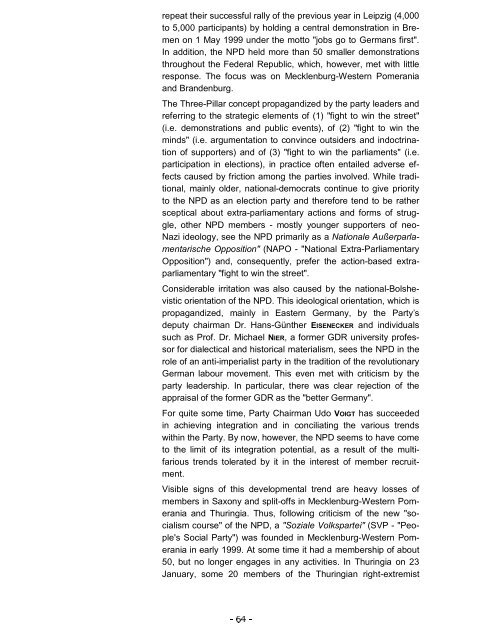Left-Extremist Endeavours
Left-Extremist Endeavours
Left-Extremist Endeavours
You also want an ePaper? Increase the reach of your titles
YUMPU automatically turns print PDFs into web optimized ePapers that Google loves.
epeat their successful rally of the previous year in Leipzig (4,000<br />
to 5,000 participants) by holding a central demonstration in Bremen<br />
on 1 May 1999 under the motto "jobs go to Germans first".<br />
In addition, the NPD held more than 50 smaller demonstrations<br />
throughout the Federal Republic, which, however, met with little<br />
response. The focus was on Mecklenburg-Western Pomerania<br />
and Brandenburg.<br />
The Three-Pillar concept propagandized by the party leaders and<br />
referring to the strategic elements of (1) "fight to win the street"<br />
(i.e. demonstrations and public events), of (2) "fight to win the<br />
minds" (i.e. argumentation to convince outsiders and indoctrination<br />
of supporters) and of (3) "fight to win the parliaments" (i.e.<br />
participation in elections), in practice often entailed adverse effects<br />
caused by friction among the parties involved. While traditional,<br />
mainly older, national-democrats continue to give priority<br />
to the NPD as an election party and therefore tend to be rather<br />
sceptical about extra-parliamentary actions and forms of struggle,<br />
other NPD members - mostly younger supporters of neo-<br />
Nazi ideology, see the NPD primarily as a Nationale Außerparlamentarische<br />
Opposition" (NAPO - "National Extra-Parliamentary<br />
Opposition") and, consequently, prefer the action-based extraparliamentary<br />
"fight to win the street".<br />
Considerable irritation was also caused by the national-Bolshevistic<br />
orientation of the NPD. This ideological orientation, which is<br />
propagandized, mainly in Eastern Germany, by the Party’s<br />
deputy chairman Dr. Hans-Günther EISENECKER and individuals<br />
such as Prof. Dr. Michael NIER, a former GDR university professor<br />
for dialectical and historical materialism, sees the NPD in the<br />
role of an anti-imperialist party in the tradition of the revolutionary<br />
German labour movement. This even met with criticism by the<br />
party leadership. In particular, there was clear rejection of the<br />
appraisal of the former GDR as the "better Germany".<br />
For quite some time, Party Chairman Udo VOIGT has succeeded<br />
in achieving integration and in conciliating the various trends<br />
within the Party. By now, however, the NPD seems to have come<br />
to the limit of its integration potential, as a result of the multifarious<br />
trends tolerated by it in the interest of member recruitment.<br />
Visible signs of this developmental trend are heavy losses of<br />
members in Saxony and split-offs in Mecklenburg-Western Pomerania<br />
and Thuringia. Thus, following criticism of the new "socialism<br />
course" of the NPD, a "Soziale Volkspartei" (SVP - "People's<br />
Social Party") was founded in Mecklenburg-Western Pomerania<br />
in early 1999. At some time it had a membership of about<br />
50, but no longer engages in any activities. In Thuringia on 23<br />
January, some 20 members of the Thuringian right-extremist<br />
����















